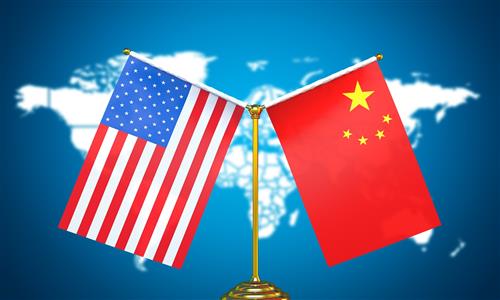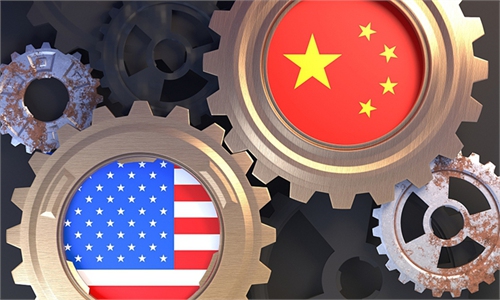US policymakers seem to be disconnected from real life of ordinary Americans: says independent Senate candidate

A consumer browses products in a supermarket in New York on September 22, 2023. Photo: VCG
Editor's Note:
While the US economy seems to be strong, some economists are warning about the risk of a hard landing. Where will the Fed's rate hikes take the US economy? Why doesn't the Fed's monetary tightening policy work as in the past? What does the situation mean for ordinary Americans' lives? In a recent interview with the Global Times (GT), Diane Sare (Sare), an independent candidate for the US Senate in the 2024 general election in New York State, shared her views on these issues. She said it is mainly because the approach taken by US policymakers toward addressing problems has often been disconnected from the real needs of Americans.

GT: There are different views about the US economic development prospects. Some believe the US economy and employment may remain strong despite the pressure of the Federal Reserve's high interest rates, while others warn that an economic recession may be inevitable because of high interest rates. What's your opinion?
Sare: I think the US economy is in terrible shape. I'm a student of Lyndon LaRouche, who was an expert in physical economy, who developed something called the triple curve function, which looks a bit like a trumpet bell, but the two curves are going up at a hyperbolic rate (financial instruments and M1, money in circulation as in QE), and one curve in a mirror image is going down at a hyperbolic rate, which is investment in the physical economy, such as hard and soft infrastructure, like transportation, energy, water, healthcare, etc.
Prior to 1971, when the US dollar was decoupled from gold, the now-three curves were unified. That is when you invested in a productive company, if the company performed well, hired more people and grew, these functions were related and all grew.
After 1971, with floating exchange rates, and the invention of all kinds of "derivatives," the curves representing productivity actually separated from the financial curve, in inverse proportion. That is, the higher the stock market rose, the more you were looting your physical means of existence, creating a shock front, as we saw in 2008, and as we are headed for now, but on a much larger scale.
I think that's partly why our government is so desperate to start wars all over the planet.
Some of the economic indicators like the unemployment rate that look strong now are actually fraudulent and distort the true level of economic hardship. People who've given up looking for work or cannot find a job for two years aren't even counted as unemployed, while part-time employees who might find only one hour of work per week are counted as employed.
GT: Inflation in the US seemed to slow to 3.7 percent in September, but it remains well above the Federal Reserve's target rate, which triggers investor worries. What do you think of the inflation level? Why don't the Fed's massive rate hikes work as effectively as in the past?
Sare: The Federal Reserve is completely divorced from reality. They're playing with numbers.
What I'm interested in is the physical standard of living. So the first effect of rates being raised was that several banks collapsed. Also, it means you can't borrow money. My friend was trying to buy a car, and the automobile loan rate is 10 percent. Food inflation might be a bit slower right now. But because of high interest rates, people cannot afford small business loans and mortgages.
The cost of food, the cost of gasoline, the cost of many things is still much higher than it was three or four years ago, but the incomes of people have not increased much. This is also why there are so many worker strikes these days in the US. The impact of high inflation rate in the past and high interest rate now negatively affected people's lives and businesses.
GT: The US federal debt has exceeded $33 trillion and this year's fiscal deficit is moving toward $1.7 trillion or more. What do you think about the US' national debts? Under what circumstances can the debt problem be resolved?
Sare: The debt keeps going up because the whole system is wrong. I think the only solution is a bankruptcy reorganization of this debt. You need to have an international conference involving major countries like the US, China, Russia, India and maybe Japan. Let them organize a new security and economic architecture.
Much of the US debt is really illegitimate, because it's tied to bailing out financial institutions that never should have been saved, or other speculative activity, and it should be written off. We should not be sending hundreds of billions of dollars to the crisis in Ukraine, or to Israel, when the American people are suffering very much from the lack of investment in basic infrastructure in the US.
According to Alexander Hamilton and LaRouche, the purpose of credit, or legitimate debt, is to increase man's power over nature. That is, invest in those things that allow your workforce to become more productive while at the same time living more comfortably - like building high-speed rail, which gets rid of wasteful traffic jams, and gets trucks off the highways. It is worse than wasteful to spend so much money on producing weapons, feeding the military industrial complex, which appears to own Congress.
GT: Despite the tensions between China and the US, many American CEOs have visited China, like Apple's Tim Cook. What do you think of the US business community's attitude toward China's development? What impact will these visits have on bilateral economic exchanges?
Sare: I think the US and China have a lot to cooperate on, and that's what the business community should do. I know many Americans who do business with China, and they don't agree with the anti-China rhetoric in Washington and don't like the trade war. It's good for businesses to have relations with each other and it might help to a certain extent. Also, many states have tried to maintain normal exchanges and relations with China, which I hope may help change the federal policy.
GT: A good number of senior US officials have recently visited China. How will that help bilateral relations?
Sare: It really depends on who is visiting. Some in Washington have a stupid idea about competition with China. One of the most destructive things ever done in the US education system was grading on the curve, where only a tiny percentage can be the best, and others have to be less good, as defined by the bell curve. Everything is a competition in that system. The only way you do better is you crush someone else. I am only good if I am better than everyone else. This has been taken to our foreign policy.
In fact, after the Berlin Wall came down, many people said the US is the global hegemony and no one can be allowed to rise above us. If the US was building high-speed rail, nuclear power plants and going to Mars, we had a higher standard of living - that is we actually were good, then others could also be prosperous without being perceived as a threat.
But instead, we shut down the space program, we shut down research projects, we collapsed the standard of living, destroyed our cities, and then said, "No one is allowed to be better off than we are." So our government resents anyone who is not willing to be impoverished and miserable.
When it comes to reducing political uncertainties about doing business with China, I think the only way is that the US has to change its mindset and become a trustworthy partner. There are many areas where China and the US can cooperate, like infrastructure. But some politicians killed the possibility for some absurd reasons. I wish the US and China can collaborate to eradicate poverty and the US can join the Belt and Road Initiative instead of trying to promote contradictory programs.


